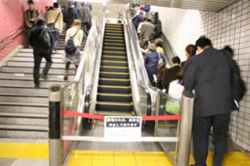Home > Highlighting JAPAN > Highlighting Japan MAY 2011 > Fearless in Tokyo
Highlighting JAPAN
COVER STORY: The Road to Recovery
Fearless in Tokyo
There are many foreign nationals who are not worried much about their sojourn in Japan. Let their words speak for themselves.
Journalist Kurt Hanson, who has been working in Japan for many years, recounts his experience on March 11, 2011 and thereafter.
I was on the third floor of the newspaper building, located on the Tokyo waterfront. I first felt a slight shaking and figured it would end quickly—we had a similar shaker two days before that turned out to be the precursor to the big one. Yet it kept shaking and I decided to exit the building because it is built on reclaimed land on Tokyo Bay. I made my way down the flights of stairs and made my way to a nearby bridge, out of the range of possible falling glass. From that vantage point I could see high-rises swaying. My colleagues joined me on the bridge and we waited out the quake until I felt it was safe to return; we still had a deadline to meet.
A colleague told me the trains had stopped and we would have to walk home. I live fairly far from office, so I was not looking forward to walking that distance. I finished work at 6 p.m. and began my exodus home but got only halfway there when I stopped at my favorite pub for a drink and dinner. At about 11 p.m. the trains started up limited service and I managed to get home at 1 a.m. aboard extremely crowded trains. Walking to my favorite pub was an amazing experience: seeing trains stopped and thousands of people walking in silence and in a long procession.
About the nuclear accident, I found out several hours after the quake as reports came into the newspaper office about problems at the plant, but I figured it was minor. Over the next several days I came to realize the situation. I found the best info came from someone who attended a British Embassy briefing offering information which was reassuring, accurate and explained the situation better than the Western press.
A co-worker fled Tokyo for five days to escape possible radioactive leaks. But, as a reporter I would have gone to the tsunami area and also Fukushima to do a story. Unfortunately my news organization decided not to send anyone there. The Western press seemingly was bent on sensationalizing the crisis, but I remembered how the Mad Cow's disease caused a panic some years back.
I think there is greater danger dying from a lightning strike than dying from a nuclear accident, so I am still working and living in Tokyo.
Another journalist, a Briton living in Yokohama, a port city just south of Tokyo, offers his thoughts.
On March 11, I was on the seventh floor of an office building in Tokyo. In my twenty years in Japan I have felt a few eye-widening tremors, but nothing like the shaking we experienced that day. I just held on to my desk and inwardly cowered. I was surprised by the actions of a couple of my colleagues, who immediately started tidying up, putting books back on the shelves and so on.
But I never for a moment considered leaving Yokohama, my adopted home. I carefully followed the advice of trusted sources and read the IAEA website studiously, and was reassured that outside the evacuation area there would be no risk to people's health. I was really, really disappointed with some of the news coverage of the Fukushima nuclear plant accidents. I believe many sections of the media failed society in their reporting of that event.

Energy-saving in Tokyo in the aftermath of the March 11 earthquake
Credit: THE JAPAN JOURNAL
Information technology engineer He Peng, who has lived in Tokyo for five years, says despite being shaken by the hugest earthquake he has felt since his arrival from Dalian, China, he was not too worried either.
Although keeping close tabs on broadcast news and the Internet, I was not worried because Japan is an advanced nation known for its preparedness in the event disasters like earthquakes and tsunamis hit. On March 11, I used my mobile phone at the office to watch the TV broadcasts. I stayed on in Tokyo because good building standards and other regulations are in place, though perhaps on my job the stability of electrical power supply made me a tad anxious. But with escalators being stopped I could work off such worries and get some exercise too!
Certainly nuclear accidents can be unnerving but it is just like accidents at any job—they can't always be prevented; as long as proper information is available, solutions can be found. I think Japanese teamwork including the energy-savings effort is helping to mitigate the disaster which struck Tohoku region. Also, as a professional with major responsibilities at the job and people depending upon me, I could not just drop everything and run off. I have seen some people returning to their homeland at the behest of their family, but in my opinion they should be making up their own minds based upon information they can gain here.
© 2009 Cabinet Office, Government of Japan






